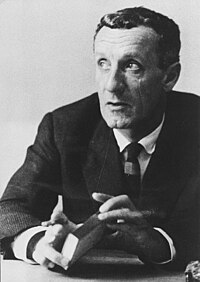
Photo from wikipedia
ABSTRACT This paper attempts to clarify Merleau-Ponty’s later work by tracing a hitherto overlooked set of concerns that were of key consequence for the formulation of his ontological research. I… Click to show full abstract
ABSTRACT This paper attempts to clarify Merleau-Ponty’s later work by tracing a hitherto overlooked set of concerns that were of key consequence for the formulation of his ontological research. I argue that his ontology can be understood as a response to a set of problems originating in reflections on the intersubjective use of language in dialogue, undertaken in the early 1950s. His study of dialogue disclosed a structure of meaning-formation and pointed towards a theory of truth (both recurring ontological topics) that post-Phenomenology premises could not account for. A study of dialogue shows that speakers’ positions are interchangeable, that speaking subjects are active and passive in varying degrees, and that the intentional roles of subjects and objects are liable to shift or ‘transgress’ themselves. These observations anticipate the concepts of ‘reversibility’ and ‘narcissism’, his later view of activity and passivity, and his later view of intentionality, and sharpened the need to adopt an intersubjective focus in ontological research.
Journal Title: British Journal for the History of Philosophy
Year Published: 2018
Link to full text (if available)
Share on Social Media: Sign Up to like & get
recommendations!